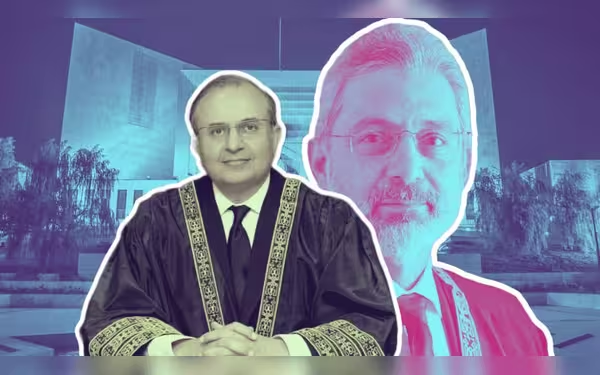Saturday, November 16, 2024 05:33 PM
Justice Mansoor Ali Shah's Stand Against Presidential Ordinance in Pakistan
- Justice Shah refuses to join bench committee until ordinance reviewed.
- Concerns raised over judicial independence and committee reconstitution.
- Emphasis on transparency and collegiality within the judiciary.
 Image Credits: thefridaytimes
Image Credits: thefridaytimesJustice Mansoor Ali Shah refuses to join committee until full court reviews presidential ordinance affecting judicial independence.
In a significant development within Pakistan's judicial landscape, Justice Mansoor Ali Shah has publicly expressed his refusal to join the bench fixing committee until the full court addresses the constitutional validity of a recent presidential ordinance. This ordinance, which amended the Practice and Procedure Act 2023, has sparked considerable debate regarding the powers it grants to the Chief Justice of the Supreme Court.
The ordinance was introduced to enhance the Chief Justice's authority in selecting the committee responsible for determining court benches. However, rather than challenging what many perceive as executive overreach, Justice Shah has taken a stand against these amendments. He has made it clear that he will not participate in the committee until a full court bench reviews the ordinance and either affirms its constitutionality or reinstates the previous committee structure.
It is important to note that the committee's last scheduled meeting was postponed shortly after the ordinance was enacted. A new meeting was quickly arranged, but it notably excluded Justice Muneeb Akhtar, the second senior-most judge, and instead included Justice Ameenuddin Khan, the fourth senior judge. This change has raised eyebrows and questions about the decision-making process behind the committee's reconstitution.
In a letter addressed to the committee's secretary, Justice Shah emphasized the need for independence, transparency, and collegiality within the judiciary. He criticized the Chief Justice for not raising concerns about the ordinance's implications, particularly in light of the Supreme Court's previous ruling in the Raja Amer case. In that ruling, the court had established that the power to regulate its own practice and procedure primarily lies with the Supreme Court, with legislative intervention being a rare exception.
Justice Shah pointed out that the recent amendments could potentially undermine the independence of the judiciary. He highlighted that the ordinance did not adequately justify its urgent need, especially given the ongoing constitutional crisis in the country. Furthermore, he noted that the previous committee, which included the Chief Justice and the two senior-most judges, could have continued its work without disruption.
He expressed concern over the lack of explanation for the removal of Justice Akhtar from the committee, despite his consistent participation since March 2024. Justice Shah criticized what he termed as “cherry picking” in the selection process, which contradicts the principles of democratic governance and judicial fairness that the Raja Amer ruling sought to uphold.
In his letter, Justice Shah reiterated the importance of collegiality within the Supreme Court, stating that the concentration of power in the hands of a single individual, such as the Chief Justice, is detrimental to the ideals of justice and fairness. He argued that fostering an environment where dissenting voices are welcomed is crucial for a healthy judicial system.
This situation raises critical questions about the future of judicial independence in Pakistan. As the Supreme Court navigates these challenges, the actions and decisions of its members will undoubtedly shape the public's perception of justice in the country. The ongoing discourse surrounding the amendments to the Practice and Procedure Act serves as a reminder of the delicate balance between judicial authority and legislative oversight, a balance that is essential for maintaining the rule of law and protecting the rights of citizens.













